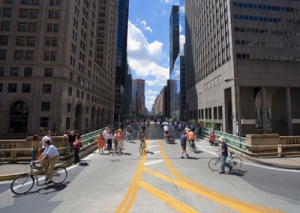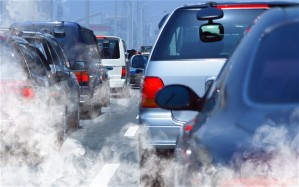Our thesis comes to an end, this means that there won’t be more posts.
However you can still read our final blog statement posted below.
Car free zones
This post I’m going to start with a reference to another blog, the blog of Colin Beavan (aka No Impact Man). In his post he describes how it looked when the city of New York turned Park Avenue, a normally very busy road in the center of New York, in a car free zone. The evolution towards more and more car free zones in cities is something I already posted about earlier.
On this site you can find some more examples about car free zones throughout the world. As you can see, the most of the examples are very touristic attractions. This is therefor an important reason for governments to decide on making a zone car free. The other major reason is the decrease of exhaust emissions and smog in the city centers as I stated in previous posts.
To finish I also included this article about the evolution toward more car free zones in Leuven, to show that this topic is also topical in our own city.
This was my last post of my blog, for my blog paper I will focus on the impact of exhaust gases. I would like to thank everyone for reading my post and commenting.
Influence of gear changing behaviour on fuel-use and vehicular exhaust emissions
I found a study where the researchers found a relation between the time when the driver changed gears and the fuel use/exhaust emissions. The results show that when changing gears early one can reduce fuel consumption by 30% on average and prevent the extra exhaust emissions due to running up the engine.
This is a simple trick that everyone can apply in its own driving behavior that has directly a noticeable impact. We as engineers all know this but there are a lot of people that are not aware how much impact this has or what is the optimal time to change gears.
I noticed that in some newer car models the on-board diagnostic system warns the driver when he should change gears, this is a step in the good direction. But also the increase of automatic gearboxes with more gear ratios can have a positive impact.
Do you have a good driving behavior or can you still improve? Here is also a fragment of Topgear where Jeremy Clarkson has a solution to reduce greenhouse gas emissions while still driving in heavy polluting cars.
Platooning
In February of this year truck manufacturer Scania performed some tests with autonomous trucks in the Netherlands. They received permission from the Dutch government, to let a convey of trucks drive on the highway autonomously, connected through Wi-Fi.
This technology, called platooning, allows truck drivers to come on to the highway, after which the truck connects itself wireless to the other trucks. When the trucks have to stop, they all stop, with the same force and at the same moment. This means that trucks can drive closer to each other, meaning fuel savings, less traffic jams and less accidents.
However just as with the autonomous car, a driver still has to be present, just in case.
Do you think Wi-Fi connected truck conveys are a good thing? I certainly think so, since trucks mostly drive on the highways, which can be tiresome for the driver. However I do wonder what will happen when it goes wrong, will the driver be fast enough to react?
The harmful effects of vehicle exhaust
In following study the researchers tried to identify the environmental harms of vehicle exhaust that affect human populations. Their goal with this information is to educate and inform the people and in specific the public and private officials to promote policies in all sectors that ensure the protection of human and environmental health.
Out of the research the scientist believe that the nation faces an epidemic of illnesses that are exacerbated by air pollution. These illnesses include cardiovascular disease, asthma, chronic obstructive pulmonary disease, lung cancer, and diabetes. At special risk are children, the elderly and those with compromised immune systems. During the past decade, scientists have confirmed a relationship between two forms of air pollution (ozone and particulate matter) and increased rates of mortality.
I personally think that this is a problem that has a big impact on our generation and generations that will follow us. Do you think that we should be better informed about the impact this has on our health or is it general knowledge? And how should we avoid some exposure to these toxic exhaust gases? Is it mostly the responsibility of our governments to make stricter policies for car manufacturers and drivers?
Hydrogen may be the fuel of the future
Hydrogen, is it the fuel of the future. It undoubtely has great benefits, such as being readily available all around us, although not in its usable form, but bounded to other molecules. This is because hydrogen in its pure form is not very stable. This can be an advantage as well as a disadvantage, if you think about the Hindenburg, which a lot of people do when hydrogen is mentioned. However when there is only a small leak the hydrogen will immediatelty react with the oxygen in the air, forming water.
Another advantage of hydrogen as fuel is that it causes no emissions at the exhaust, however depending on how hydrogen is produced it can be polluting (but also almost no pollutant when wind energy is used for example)
the disadvantages are also known, it is highly flammable, but this is also an advantage in an internal combustion engine.
Because of the way hydrogen is produced, through hydrolysis, it is expensive and will probably stay that way.
It would be wrong to look at hydrogen as fuel, we should look at it as a way to store energy in a more environmentally friendly way than batteries.
Keeping all this in mind some constructers have stated that hydrogen fuel cell cars may be released as soon as 2017.
But a lot remains to be done, infrastructure will have to be build, opinions need to be changed. Still a lot of people think of the Hindenburg, as mentioned before, even though today it would be safer, just think of how many cars fuelled by LNG you heard exploded in the last few years.
Autonomous cars in Belgium
This weekend Elon Musk announced that the latest series of Tesla model S can easily be transformed into self driving vehicles through the means of a software update. He says that within three months we can have the first autonomous vehicles driving on the road.
And there’s more news; the Belgian department of Mobility has announced they will give the green light for autonomous vehicles on Belgian roads.
But before you go out spotting cars without drivers there’s a few things you need to know. First Tesla says it will only allow autonomous driving on the highway, because city traffic is still too complex for the computational force available.
Second according to the law, somebody still has to be present, able to take over the wheel and he or she has to have a valid driver’s license. So you won’t be able to call your car and get you home after a night out of drinking, because you won’t be able to take over the wheel in an emergency.
Than there’s the question of insurance. Who has to pay when an accident happens. The insurance companies will use the same policy as they do with self parking cars, meaning they will have the driver pay and not the manufacturer.
What do you think of all these recent announcements? Do you think the autonomous car is a good thing or is it too soon to release it?
Hydrogen fuel cell busses
VanHool the famous bus producer from Koningshooikt in Belgium has announced to produce 22 more busses for the european market powered by a hydrogen fuel cell, in order to comply with the zero-emmision cities goal from the European Union.
VanHool has proofed that hydrogen can work as a relaible and safe alternative for other fuels such as diesel, but even CNG an LNG.
However some remarks have to be made, where will the hydrogen come from? Presumably the will take the hydrogen from a Solvay site, where it is produced as a byproduct, but this is not confirmed. If hydrogen is to be produced from for example methane, we are as far to a clean future as we are now.
Hydrogen can be a clean fuel and can even be the fuel of the future, since when produced by windmills there is almost no polution, except for the impact of the production of the windmill.
http://www.egear.be/van-hool-waterstofbussen/
http://www.madeinmechelen.be/nieuws/van-hool-levert-bussen-op-waterstof-aan-de-lijn/
The driverless car II
What will happen when the autonomous car is completely integrated into society? Of course things will have to be changed. What will happen to the old cars?
In a recent interview Elon Musk stated that he thinks it will be necessary to forbid people from driving a regular car, when the driverless car has become the norm and that this might happen as soon as twenty years from now. But what about the people who can’t afford a driverless car, can you really force them to buy one? Maybe some companies will show up, who will convert your old car into an autonomous one?
But what about the car enthusiast then? They like owning and more importantly driving a car, will this be limited to places such as tracks? Or will they still be able to drive on public roads, but under strict regulation.
We now face the same questions as they did more than a hundred years ago, when the car started to become more popular than the horse. Yet today you can still see people riding horses on the streets, but only for pleasure. I think the same will happen to the car as we know it today. What do you think?
http://www.theguardian.com/technology/2015/mar/18/elon-musk-self-driving-cars-ban-human-drivers
Car-Free City
The ever increasing amount of vehicles has off course a big impact on emissions and the availability of fossil fuels. But there is also another big factor that is influenced by the large amount of vehicles, traffic. This is a factor that is not influenced by developing more efficient technologies like electric vehicles. When you drive through a city you notice this problem immediately when you are stuck in a traffic jam during rush hour. With increasing development of public transport and better infrastructure for bikers and pedestrians cities are trying to decrease this number of traffic jams, but this is nog a simple challenge. In a project in China they have set 78 million square feet of land aside for the construction of new city designed to house 80,000 residents, none of whom will need a car to get around. Another example is Freiburg in Germany where there are many pedestrian-only zones in the city center. Here is the article that I encountered on this subject.
http://www.theurbanist.org/2014/05/29/is-a-car-free-city-a-practical-idea/
Do you think that these car free zones will become more popular in the future? And where do you think they should focus on as an alternative for the use of a car in a city? Public transport, bikes or something else maybe?

